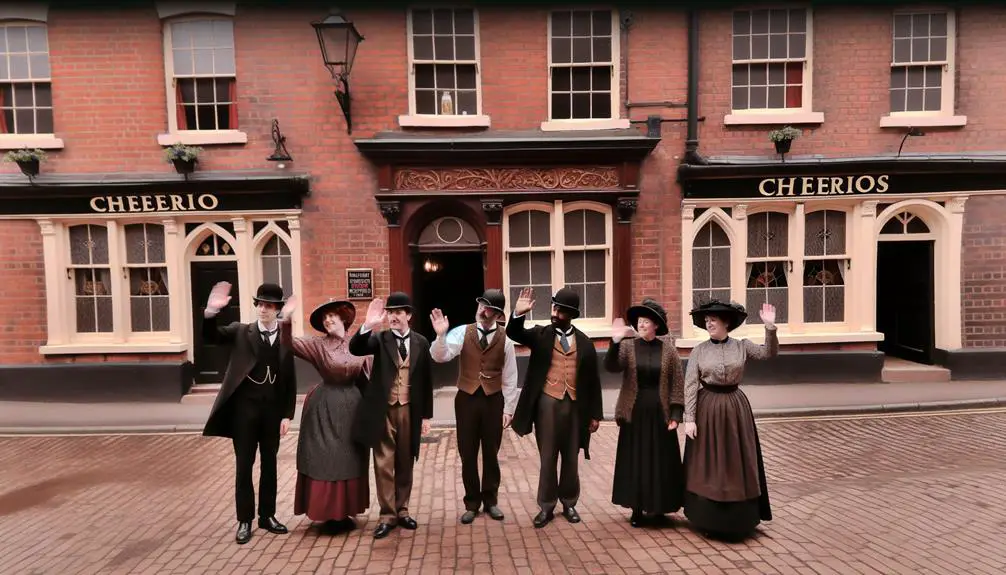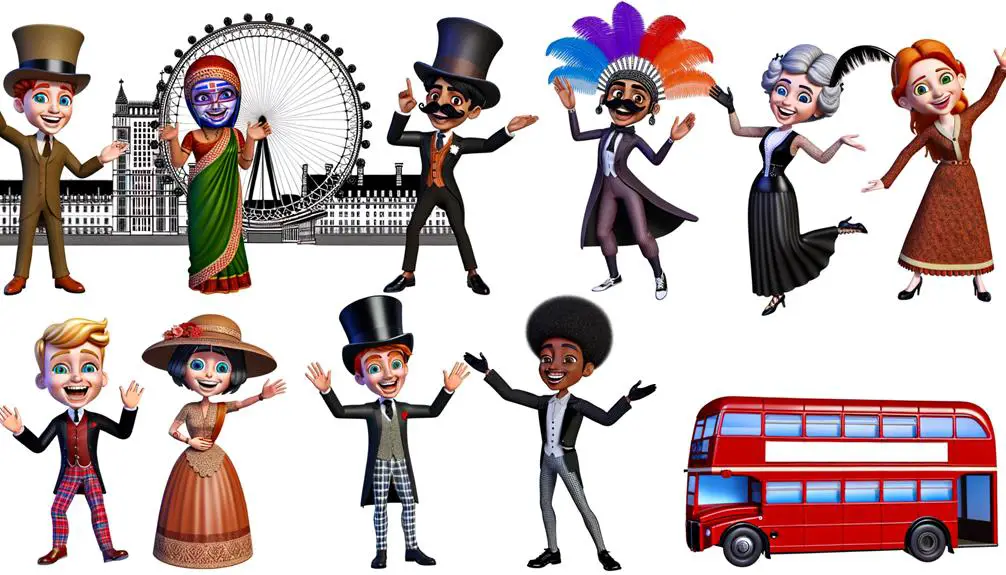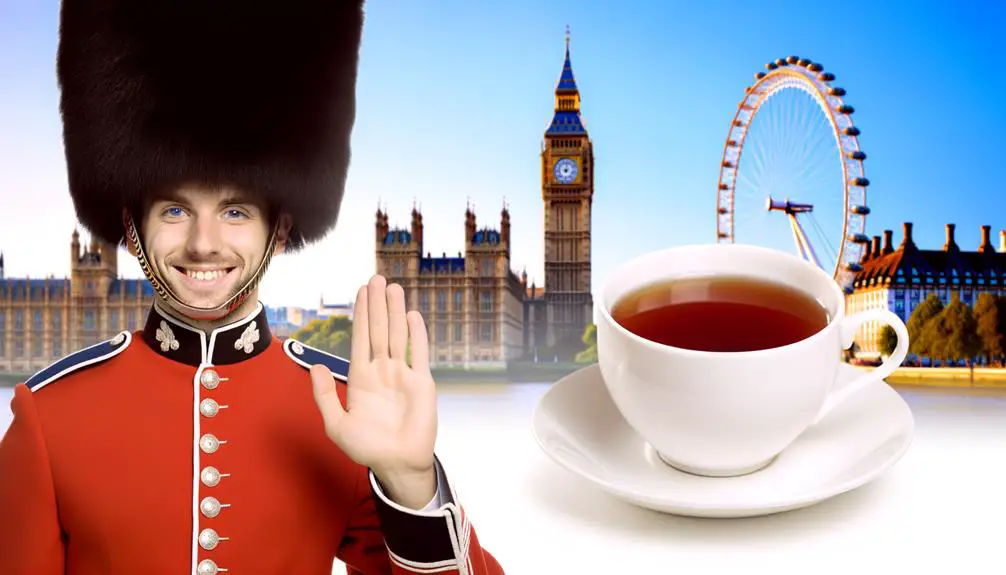In British slang, 'cheerio' serves as an informal farewell, deeply ingrained in the nation's lexicon since the early 20th century. This term embodies more than a mere goodbye; it reflects a broader cultural ethos of politeness and indirect communication, marking social transactions with warmth and familiarity. Its origins trace back to a period of linguistic adaptation, where social etiquettes and the values of camaraderie and courtesy began to intertwine with everyday speech. The evolution of 'cheerio' maintains its core identity as a lighthearted departure phrase, while its usage underscores the intricate nuances of British social etiquette. Grasping the full significance of 'cheerio' reveals layers of social cohesion and cultural significance, offering insight into the collective British psyche.
Key Takeaways
- Cheerio is an informal British expression used to say goodbye.
- It carries a tone of warmth, friendliness, and affection.
- Originated in early 20th-century Britain, reflecting social etiquette.
- Beyond a simple farewell, it evokes camaraderie and shared cultural understanding.
- Embedded within the British lexicon, it's indicative of politeness and social cohesion.
Origins of "Cheerio"

The term 'Cheerio' traces its origins to early 20th-century Britain, where it emerged as a colloquial expression of goodwill. As you explore its roots, you'll find that its farewell etymology is steeped in the social fabric of a rapidly changing British society. The greeting evolution reflects a linguistic adaptation to new modes of communication and social interaction. Initially, 'Cheerio' served as a warm, informal way to say goodbye, but its usage quickly expanded, reflecting broader societal changes.
Analyzing the development of 'Cheerio', you'll observe that it encapsulates the linguistic phenomenon of greeting evolution. This term's shift from a novel expression to a staple of British vernacular illustrates how language evolves in response to cultural shifts. Interestingly, the farewell etymology of 'Cheerio' reveals much about the context in which it gained popularity. The early 20th century was a period marked by significant social upheaval and technological advancements, which facilitated faster and more casual forms of communication. Consequently, 'Cheerio' not only became a symbol of friendly parting but also mirrored the era's social dynamics and communicative practices.
Literal and Slang Meanings
Fascinatingly, 'Cheerio' often functions both as a genuine farewell and a term imbued with deeper cultural significance, suggesting a nuanced interplay between its literal and colloquial interpretations. Historically anchored within the British lexicon, this expression serves not only as a farewell greeting but also encapsulates a broader, informal goodbye that carries with it an air of warmth and familiarity. This duality underscores its versatility within the English language, particularly within the contexts of British social etiquette and communication norms.
Analyzing 'Cheerio' beyond its surface-level utility as an informal goodbye, one uncovers layers of cultural connotations that reflect the British propensity for understatement and subtlety in social interactions. Its usage evokes a sense of camaraderie and endearment, distinguishing it from more perfunctory or formal farewells. Additionally, the term's evolution over time has seen it retain its core identity as a lighthearted departure phrase, while also adapting to various social and contextual nuances that underscore its enduring relevance in British society.
Thus, 'Cheerio' exemplifies the intricate relationship between language and culture, serving as a lens through which the values and characteristics of British communication can be observed and understood. Its significance transcends the mere act of parting, embodying a rich tapestry of social interaction and linguistic tradition.
Usage in Everyday Conversation

In everyday conversation, you'll find that 'Cheerio' seamlessly integrates into the fabric of British social exchanges, embodying a blend of casual farewell and deeper cultural resonance. This term, rich in history and nuance, extends beyond a mere goodbye, embedding itself into the complex tapestry of greeting etiquette. Its usage is indicative of a culture that values understatement and affability, qualities that resonate with both nationals and foreigners alike, shaping international perceptions of British courtesy.
- Conveying Warmth and Affability: 'Cheerio' is not just a way to end a conversation; it's a means of leaving on a note of goodwill, often infused with a tone of hope for future encounters.
- Signaling Social Cohesion: In group settings, the term acts as a verbal cue, reinforcing social bonds and shared cultural understanding. It's an acknowledgment of togetherness and communal identity.
- Reflecting Societal Values: The use of 'Cheerio' mirrors the British penchant for polite demureness and indirect communication, showcasing a preference for subtlety over exuberance in social interactions.
Analyzing its application reveals much about the British psyche, illustrating a deep-seated inclination towards courtesy and the maintenance of social harmony.
Variations and Confusions
Understanding the nuanced fabric of British slang, 'Cheerio' often presents itself in various forms and can sometimes lead to misunderstandings among those less familiar with its diverse applications. At its core, 'Cheerio' is a parting expression, akin to saying goodbye. Yet, its variations and the context in which it's used can alter its meaning, leading to common misinterpretations.
One such variation involves the tone and situation. A cheerful, upbeat 'Cheerio!' might convey genuine warmth or friendliness upon departure, whereas a more subdued or sarcastic tone could hint at relief or even disdain at the parting. This subtlety is not always easily grasped by non-natives, who might only recognize the word for its surface value as a farewell, missing these nuanced emotional cues.
Moreover, global comparisons further complicate understanding. For instance, in American English, 'Cheerio' is often associated exclusively with a brand of breakfast cereal, lacking any connotation of departure. Such differences highlight the importance of context and cultural nuance in interpreting slang. As slang reflects the evolving language landscape, 'Cheerio' exemplifies how a single term can encapsulate a spectrum of meanings, challenging global audiences to look beyond the literal to grasp its full, intended significance.
Cultural Significance in the UK

Within the cultural tapestry of the UK, 'Cheerio' holds a distinctive place as a colloquial farewell that embodies both historical depth and social nuance. This term, steeped in British politeness, offers more than just a way to say goodbye; it reflects the intricacies of farewell etiquette within British society. Analyzing its cultural significance, you'll find that 'Cheerio' isn't merely a word but a symbol of the values and manners that are cherished in the UK.
- Historical Roots: 'Cheerio' traces back to the early 20th century, emerging from the British upper class. Its usage quickly spread, becoming a staple in the lexicon of all social strata, demonstrating the democratization of language within British culture.
- Social Fabric: It serves as a linguistic thread that weaves through various levels of British society, embodying the nation's affection for understated, yet heartfelt, farewells.
- Global Influence: While distinctly British, 'Cheerio' has permeated global consciousness through British literature, television, and film, showcasing the UK's cultural export capabilities and influencing international perceptions of British social customs.
Through 'Cheerio', you're glimpsing into the heart of British cultural identity, where politeness and propriety reign supreme.







